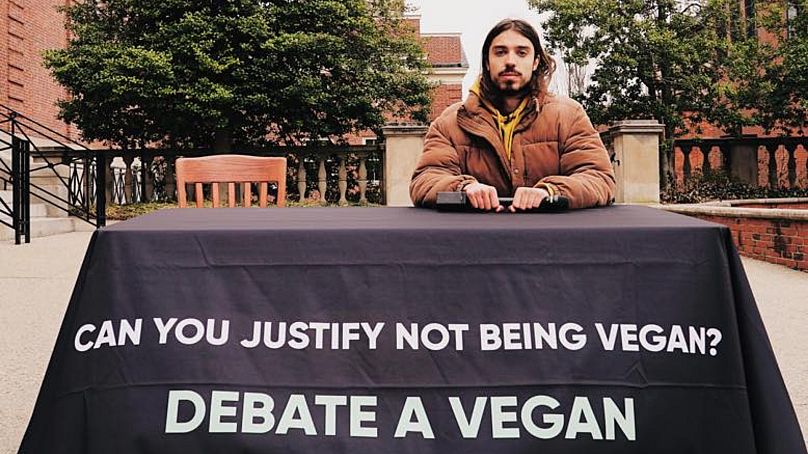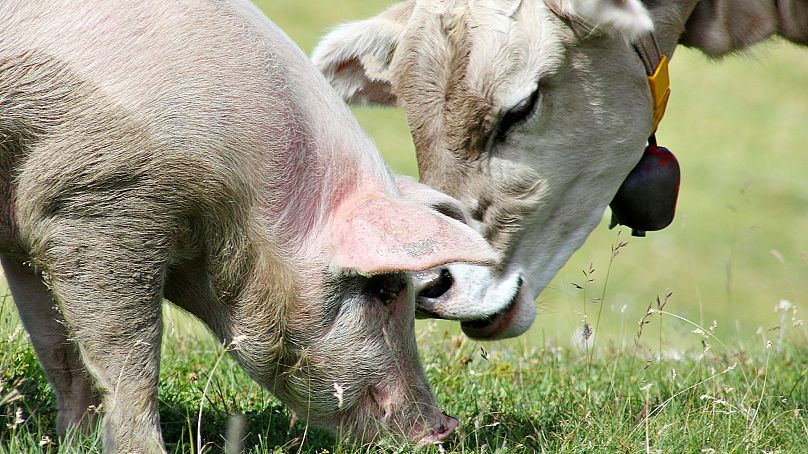Vegan educator Ed Winters tells us why a meat-free diet is good for health, the environment and animal welfare.
Ed Winters is a vegan educator, public speaker and content creator based in London, England.
Let’s say you’re walking down the street and you see someone attempting to cut a dog’s throat, what would you do?
Now let’s say you’re walking down the street and you see someone attempting to cut a pig’s throat, what would you do now?
And now let’s say that you’re walking down the street and someone is attempting to cut a pig’s throat, except now, instead of being in front of you, the pig’s throat is being cut behind a wall in a slaughterhouse where you can’t see them. Morally, has anything changed?
Of course, the obvious answer would be that the act of killing an animal in a slaughterhouse is legal. However the question then becomes, does legality equal morality? We can look throughout our history and indeed the world today to see that it certainly doesn’t.
We might then say, the biggest difference is that we don’t kill dogs, but pigs are bred to be killed and it’s what we’ve always done. But should the longevity of an action determine whether or not that action is morally justified?
In the words of renowned computer scientist, Grace Hopper, “The most dangerous phrase in the language is, ‘We’ve always done it this way’.”
Why does it matter if the pigs were bred to be farmed? Would we make the argument that dog fighting is moral as long as the dogs were bred specifically to fight? It’s interesting to think about whether there is a difference between killing a dog and killing a pig, other than the fact that we have created arbitrary distinctions based solely on the culture we have been raised in.
But should culture dictate morality? Again, we can look throughout history, and indeed the world today, to see examples of why it shouldn’t.
Is there such a thing as humane slaughter?
So then we might make the argument that the act of killing is moral in a slaughterhouse because it’s done humanely. However, synonyms for the word humane include compassionate, benevolent and kind. Would you say it’s benevolent to take the life of someone who doesn’t need to die? Or, to put it another way, to cut the throat of someone needlessly.
The very act of taking someone’s life when they don’t need to die is the polar opposite of being compassionate, benevolent and indeed humane. Humane slaughter is an oxymoron that seeks to reassure us that we don’t need to worry about the animals, even though we would never want the bloody knife in our own hand.
Ultimately, the reason we would actively intervene if an animal was being killed in front of us speaks to something else, which is that we all wish to avoid seeing animals fearful and in pain.
Each and every one of us says we are against animal cruelty, but what does being cruel to an animal mean?
The word cruelty is defined as being a ‘behaviour which causes physical or mental harm to another’. So if kicking a dog constitutes cruelty, then what about suffocating pigs with carbon dioxide gas? If throwing a cat constitutes cruelty, then what about hanging a mother cow on a kill line and cutting her throat simply because she is no longer profitable to a dairy farmer?
We are all sentient beings
Now undeniably, humans and non-human animals are different in a multitude of ways. However, when it comes to deciphering whether or not exploiting animals is morally justified, it is not our differences that are relevant, but instead what we share in common. They, like us, are sentient.
They, like us, can suffer and feel pain and actively seek to avoid suffering and pain. They, like us, have families, friends and can form deep and fulfilling connections with one another.
Ultimately, like us, they were born into a body they did not choose to be born into. A pig did not choose to be born a pig. A dairy cow did not choose to be born a dairy cow. And if given the choice, none of us would ever want to be born into their bodies either.
So what right do we have to exploit and kill these animals when if they barked instead of oinked they would be viewed as a member of the family, rather than a piece of flesh for the dinner plate?
Taste comes at a cost
Because in the end, that’s really what it boils down to. Taste. These animals are exploited and then killed because we enjoy the taste of their flesh and secretions in a meal that lasts fifteen minutes. Someone’s entire life taken from them for a fleeting moment of pleasure.
But do we believe that sensory pleasure is a moral justifier for our actions? Because when we justify eating animal products by saying that they taste nice, that is in essence what we are saying.
We are positioning our taste buds as being more important than their life. But what does have higher value, taste or life?
Does personal choice come into it?
I do think it’s important to mention that it is a personal choice what we choose to eat, or in the case of meat, who we choose to eat.
However, something isn’t considered moral simply by the virtue of it being a personal choice. What I mean by that is, everything is a personal choice, regardless of whether that choice would be deemed moral or not. For example, someone who kicks a dog has personally chosen to do so, but that doesn’t make the act moral.
Of course, the difference between kicking a dog and buying an animal product is that it is legal to buy an animal product. And so we end up at the same place we started.
Vegans can often be accused of forcing their beliefs on other people, but ultimately nobody can force anyone else to be vegan. However, when we buy an animal product, we are forcing an animal to live a life of exploitation and then to have that life taken from them against their will.
What could be more forceful than that? It may not be our hands, but make no mistake, we are the ones who sentence them to death.
In the end, the ethical case for veganism is a simple one. Their life, their autonomy, their individuality, their sentience and their capacity to experience places their worth of life as being far higher than the arbitrary reasons we use to exploit them.














